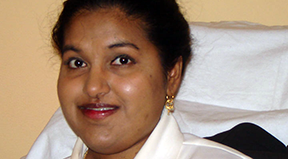Kavita

My name is Kavita. I am a PhD student in computer science at the University of Maryland, Baltimore County (UMBC) and I plan on graduating in three years. I earned my bachelor’s degree in computer science and mathematics from UMBC.
I conduct research that increases independence for people with disabilities and impacts the field of human robot interaction. Specifically, I work on the design and development of a robotic system to assist people with disabilities in their daily lives. I may not achieve all of my research goals before I finish my PhD, but I look forward to continuing to work on them throughout my career.
Does your disability affect your education?
I have the motor neuron disorder called spinal muscular atrophy. Due to the severity of my disability, I am only able to move the index finger of my right hand. With my index finger, I have the ability to use a computer with a trackball mouse and an onscreen virtual keyboard with word prediction. Studying computing with a disability is difficult, however, it is possible to succeed with the help of campus support services and professors about your individual needs and accommodations. In my own experience, Student Support Services at UMBC has helped me effectively communicate with professors, arrange extended time to submit course work, attend classes remotely via Skype, and secure electronic books.
How did you get interested in computing?
I am passionate about computing because it allows me to maximize my potential without being hindered by my physical limitations. The field is highly accessible and accommodations are easy to implement if accessibility ever becomes an obstacle. Additionally, computing allows me the opportunity to contribute to assistive technology development that may help maximize the potential of other people with disabilities like mine.
Last year, my colleagues and I worked to improve path planning performance of robotic arm movements by caching frequent arm trajectories and creating a "roadmap" of actions to ensure fast user response times. Our approach resulted in a significant increase of a 56% faster time for the arm to reach out. This research work was presented at an international conference called Pervasive Technologies Related to Assistive Environments.
Last summer, I participated in an AccessComputing internship as a robotics interaction researcher. I implemented an accessible web interface to control a simulated robotic hand using WebGL. I also designed an interface with 3D graphical models, animations, and special effects using Blender and JavaScript.
Currently, my research project involves identifying the needs, expectations, and interaction preferences of people with disabilities when controlling a robot. Since standard robotics interfaces are not accessible, data collected from our study will be analyzed to shape the preliminary design of an accessible robotic interface based on unique user abilities, needs, and preferences.
To promote disability awareness on campus, I founded and led UMBC’s first organization for students with disabilities, the Society of Inspiring Individuals with Abilities (SISIA). In that organization, I led seminars to help develop self-advocacy skills and led members to fulfill a monthly service project, such as a food drive.
What are you going to do with your degree?
After graduate school, I am interested in conducting research and teaching. I want to emphasize the importance of an inclusive environment for all by conducting academic research. I hope to advance technology development and increase diversity as a leader in computing, accessibility, and robotics. I want to increase the active participation of underrepresented minority groups in the community locally, nationwide, and internationally via research, especially people with disabilities, in order to improve their quality of life.
Why should I study computing?
Computing is a great field to get into. Technology keeps growing every year so computing jobs will always be in high demand. If you’re interested in a career in computing, take some time to figure out what your goals are. Find a mentor in a computing field who can help you learn more about what it’s like. Learn more by browsing technical websites, like the Institute of Electrical and Electronics Engineers (IEEE) Spectrum and Wired.com—they are a rich source of inspiration and a way to keep up to date with current technology trends. And practice your programming skills—they’re important!
Patience is important for learning in any domain—the same is true for computing. Passion is essential to fuel the energy for learning. Persistence is necessary to overcome any obstacles in learning computing.
Come join us! You won't regret the best decision in your life. You could make very significant contributions in this field and be acknowledged for your abilities.